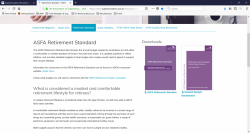- Joined
- Jan 26, 2011
- Posts
- 30,204
- Qantas
- Platinum
- Virgin
- Red
I think if we’d done this while on a salary it wouldn’t have been appreciated so much.we have been doing the same for a few year now - we can’t claim se down the company until retained profits are zero, so are paying ourselves dividends each year until they are exhausted. A new ce bonus after years of paying large amounts of company tax!














